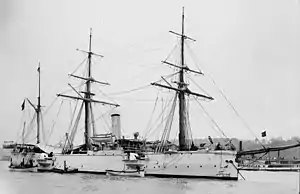Spanish cruiser Isabel II
Isabel II was a Velasco-class unprotected cruiser of the Spanish Navy, named after Queen Isabella II. The ship fought at San Juan, Puerto Rico, during the Spanish–American War.
 An unidentified Velasco-class (here called "Infanta Isabel-class") cruiser in U.S. waters during the 1880s or 1890s, showing the appearance of Isabel II | |
| History | |
|---|---|
| Name: | Isabel II |
| Namesake: | Queen Isabella II of Spain. |
| Builder: | Ferrol |
| Laid down: | 1883 |
| Launched: | 19 February 1886 |
| Completed: | 1888–89 |
| Fate: | Stricken 1907 |
| General characteristics | |
| Class and type: | Velasco-class unprotected cruiser |
| Displacement: | 1,152 tons |
| Length: | 210 ft 0 in (64.01 m) |
| Beam: | 32 ft 0 in (9.75 m) |
| Draft: | 13 ft 8 in (4.17 m) maximum |
| Installed power: | 1,500 ihp (1,100 kW) |
| Propulsion: | 1-shaft, horizontal compound, 4-cylinder boilers |
| Sail plan: | Barque-rigged |
| Speed: | 13 knots (24 km/h; 15 mph) |
| Complement: | 173 officers and enlisted |
| Armament: |
|
| Notes: | 200 to 220 tons of coal (normal) |
Technical characteristics
Isabel II was built at the naval shipyard at Ferrol. Her keel was laid in 1883 and the ship was launched on 19 February 1886. Isabel II was completed in 1888 or 1889. She had one rather tall funnel. She had an iron hull and was rigged as a barque.[1]
Operational history
When the Spanish–American War began in April 1898, Isabel II was at San Juan, Puerto Rico. The U.S. Navy established a permanent blockade of San Juan on 18 June 1898.[2]
On 22 June 1898, Isabel II, gunboat General Concha, and destroyer Terror came out of port to test the blockade, resulting in the Second Battle of San Juan. The auxiliary cruiser USS St. Paul moved in, resulting in a short, running gun battle, from which the Spanish quickly broke away. Isabel II and General Concha could go no faster than 10 knots (19 km/h; 12 mph); Terror made a torpedo run on St. Paul to cover their retreat, and was badly damaged by gunfire from St. Paul, but all three Spanish ships made it back into port at San Juan. Two men had been killed aboard Terror, the only casualties either side suffered during the battle.[2]
On 28 June 1898, Isabel II, General Concha, and gunboat Ponce de Leon sortied to assist a Spanish blockade runner, the merchant steamer Antonio Lopez, make it into San Juan's harbor. The three Spanish warships exchanged long-range gunfire with St. Paul, Yosemite, and the cruiser New Orleans, with neither side scoring any hits. When it became clear that Antonio Lopez would not be able to get past the Americans, the Spanish warships returned to port, where they spent the rest of the war. Antonio López ran aground, but most of her cargo was successfully unloaded by the Spanish.[3]
Isabel II returned to Spain after the end of the war. She was stricken in 1907.[4]
Notes
- Conway's All the World's Fighting Ships, 1860–1905, p. 383
- Nofi, p. 166
- Nofi, p. 167
- Conway's All the World's Fighting Ships, 1906–1921, p. 377
References
- Chesneau, Roger, and Eugene M. Kolesnik, Eds. Conway's All The World's Fighting Ships 1860–1905. New York, New York: Mayflower Books Inc., 1979. ISBN 0-8317-0302-4.
- Gray, Randal, Ed. Conway's All The World's Fighting Ships 1906–1921. Annapolis, Maryland: Naval Institute Press, 1985. ISBN 0-87021-907-3.
- Nofi, Albert A. The Spanish–American War, 1898. Conshohocken, Pennsylvania:Combined Books, Inc., 1996. ISBN 0-938289-57-8.